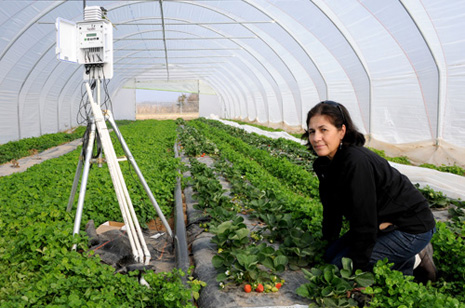
FAYETTEVILLE, Ark. – Research by the University of Arkansas Division of Agriculture on organic fruit production and the use of “high tunnels” of plastic sheeting over metal frames to extend the season for fresh fruit into late fall and early spring will be presented at the annual Horticulture Industries Show Jan. 14-15 at the Holiday Inn Convention Center in Fort Smith.
Alison Wiediger of Au Naturel Farm in Kentucky, which uses organic methods to produce salad greens in high tunnels during the winter, will be the keynote speaker.
Division of Agriculture fruit and nut extension specialist Elena Garcia and horticulture professor Curt Rom will report on research at the division’s research and extension center in Fayetteville on high tunnel production of blackberries, raspberries and strawberries. The research is funded in part by grants from the U.S. Department of Agriculture.
High tunnels may become practical for small-scale growers to produce fresh fruits and vegetables for sale to local consumers at premium prices before and after the normal seasons, Garcia said.
Only a few specialty growers, such as North Pulaski Farm near Little Rock and Dripping Springs Garden near Huntsville, are using high tunnels in Arkansas, but they are more widely used in some other states, Garcia said. North Carolina State University is developing recommendations for high tunnel production of strawberries in a climate similar to north Arkansas, which provides the basis for Garcia’s research in Fayetteville.
High tunnels, which can be built for $1 to $4 per square foot, are unheated and use passive ventilation. They protect plants from damage by rain, wind, hail and cold and reduce the need for chemicals because the protected environment is less conducive to plant diseases than the open field environment, Garcia said.
Rom has reported that yields and size of raspberries and blackberries were generally greater in tunnels than in corresponding field plots, and less fruit were lost due to frost or rain damage.
The first year of the project with strawberries under high tunnels produced berries the first week of December, and plants continued to flower and fruit throughout the month, Garcia said. Adjustments are needed for better timing of fruit production and higher yields during desired market windows, she said.
The goal is to provide strawberries for the Thanksgiving holiday period and another crop in March, Garcia said. Timing of berry production proved to be tricky due to the effect of variable temperatures on flowering, she said.
Conventional strawberry varieties flower and fruit in response to changes in day length. Their normal harvest season is in May. “Day neutral” plants used for season extension flower continuously as long as temperatures are between 40 and 85° F.
Garcia planted day neutral Festival and Albion strawberry plants acclimated in North Carolina for winter production for experimental purposes.
Documentation of effective production practices may lead to increased availability of suitable varieties and development of a local off-season marketing system, which are currently limiting factors for practical use of high tunnels for strawberry production in Arkansas, Garcia said.
Other presentations at the 2011 Horticulture Industries Show in Fort Smith will include research results on insect pest management, soil fertility, bio-fumigation for plant disease management, high tunnel construction and economic analysis. A program and registration information is available online at http://www.hortla.okstate.edu/his/.
Topics
Contacts
Howell Medders, Coordinator
Agricultural Communication Services
575-5647,